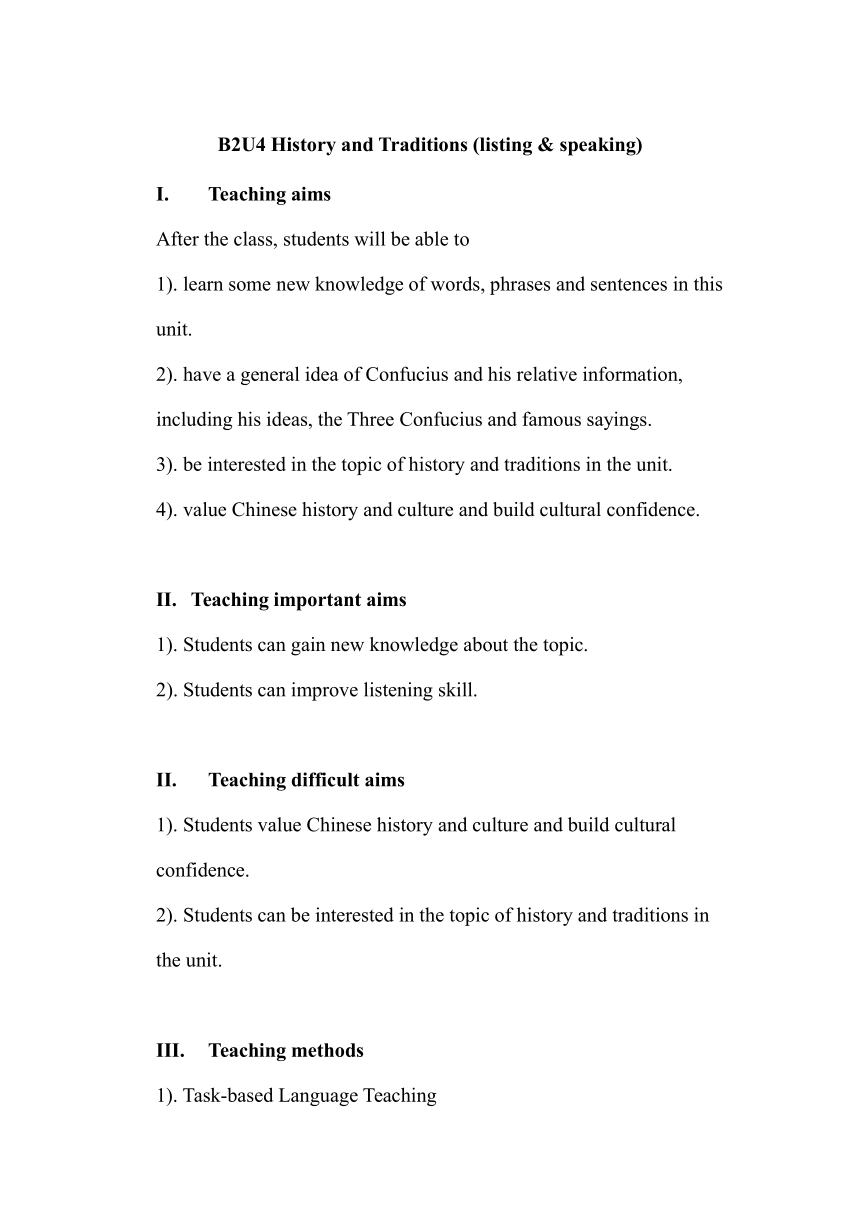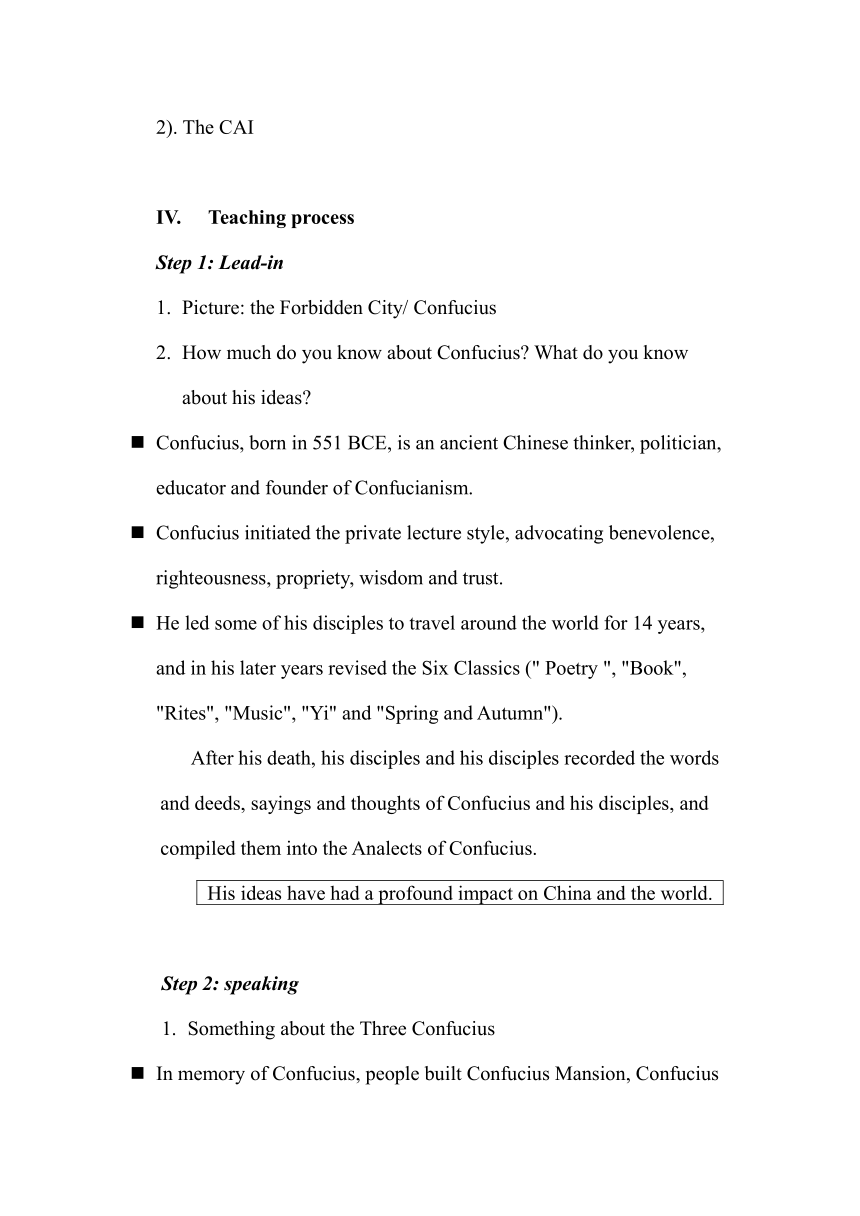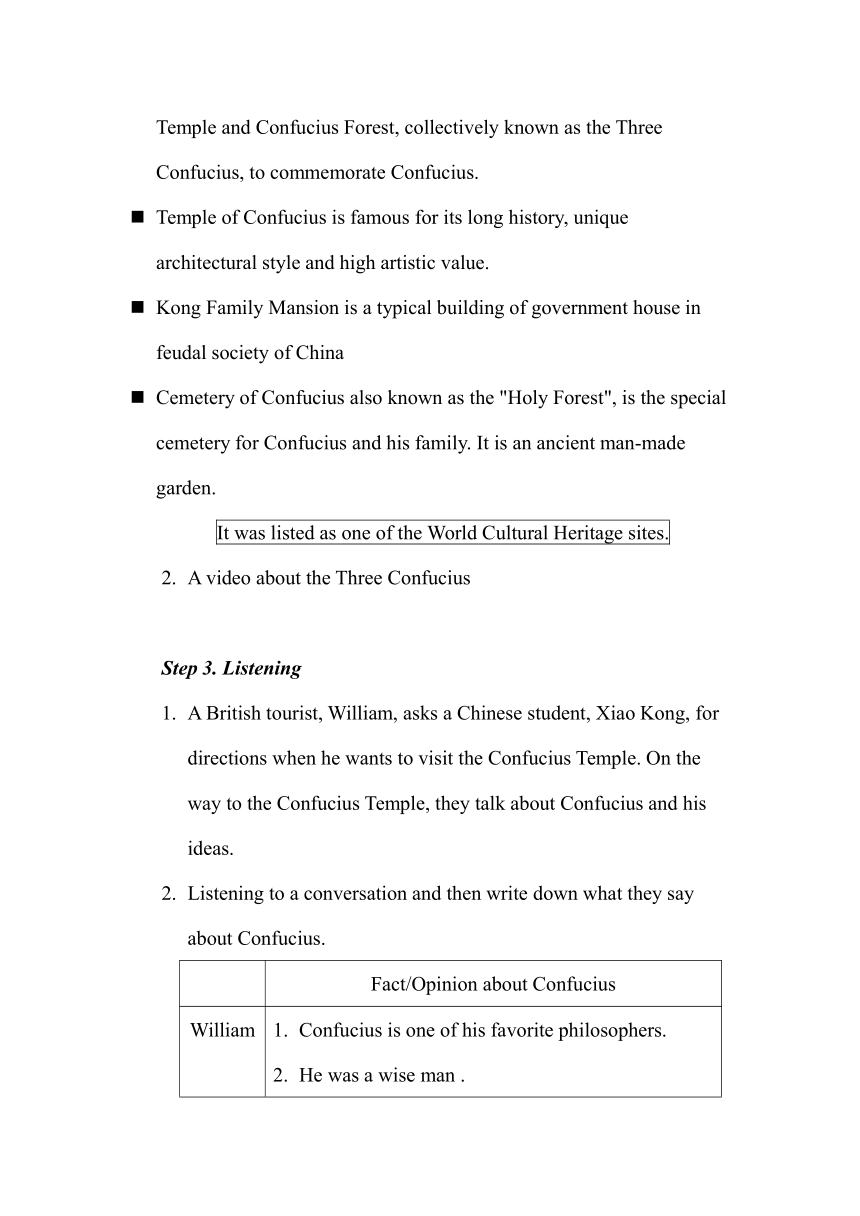人教版(2019)必修第二册 Unit4 History and traditions Listening and speaking教学设计
文档属性
| 名称 | 人教版(2019)必修第二册 Unit4 History and traditions Listening and speaking教学设计 |

|
|
| 格式 | docx | ||
| 文件大小 | 17.5KB | ||
| 资源类型 | 教案 | ||
| 版本资源 | 人教版(2019) | ||
| 科目 | 英语 | ||
| 更新时间 | 2023-03-09 22:35:55 | ||
图片预览



文档简介
B2U4 History and Traditions (listing & speaking)
Teaching aims
After the class, students will be able to
1). learn some new knowledge of words, phrases and sentences in this unit.
2). have a general idea of Confucius and his relative information, including his ideas, the Three Confucius and famous sayings.
3). be interested in the topic of history and traditions in the unit.
4). value Chinese history and culture and build cultural confidence.
II. Teaching important aims
1). Students can gain new knowledge about the topic.
2). Students can improve listening skill.
Teaching difficult aims
1). Students value Chinese history and culture and build cultural confidence.
2). Students can be interested in the topic of history and traditions in the unit.
Teaching methods
1). Task-based Language Teaching
2). The CAI
Teaching process
Step 1: Lead-in
Picture: the Forbidden City/ Confucius
How much do you know about Confucius What do you know about his ideas
Confucius, born in 551 BCE, is an ancient Chinese thinker, politician, educator and founder of Confucianism.
Confucius initiated the private lecture style, advocating benevolence, righteousness, propriety, wisdom and trust.
He led some of his disciples to travel around the world for 14 years, and in his later years revised the Six Classics (" Poetry ", "Book", "Rites", "Music", "Yi" and "Spring and Autumn").
After his death, his disciples and his disciples recorded the words and deeds, sayings and thoughts of Confucius and his disciples, and compiled them into the Analects of Confucius.
His ideas have had a profound impact on China and the world.
Step 2: speaking
Something about the Three Confucius
In memory of Confucius, people built Confucius Mansion, Confucius Temple and Confucius Forest, collectively known as the Three Confucius, to commemorate Confucius.
Temple of Confucius is famous for its long history, unique architectural style and high artistic value.
Kong Family Mansion is a typical building of government house in feudal society of China
Cemetery of Confucius also known as the "Holy Forest", is the special cemetery for Confucius and his family. It is an ancient man-made garden.
It was listed as one of the World Cultural Heritage sites.
A video about the Three Confucius
Step 3. Listening
A British tourist, William, asks a Chinese student, Xiao Kong, for directions when he wants to visit the Confucius Temple. On the way to the Confucius Temple, they talk about Confucius and his ideas.
Listening to a conversation and then write down what they say about Confucius.
Fact/Opinion about Confucius
William Confucius is one of his favorite philosophers. He was a wise man . He lived over 2000 years ago.
Xiao Kong Confucius has over 3 million descendants. He was a great educator and had many ideas about education. He was one of the greatest minds in history.
3 Listen again and decide whether these statements are true(T), false(F), or not mentioned (NM). Then answer the question.
1). Confucius said that learning without understanding leads to confusion.
2). Xiao Kong is doing a research project on Confucius philosophy.
3). As one of Confucius’ descendants, Xiao Kong’s name is recorded in the family tree.
4). Dacheng Ha is the tallest building in Qufu.
5). Why do you think William said his hometown was similar to Qufu
A. There are famous halls in his hometown.
B. There are no tall buildings in his hometown.
C. Both places have a famous person who was born there.
D. His hometown doesn’t allow other buildings to be more noticeable than the historic buildings.
4. Listening text
Achilles’ heel-- Something that is someone’s weakness
pulling my leg-- joke with someone
like a fish out of water-- Someone who feels uncomfortable because they are in an unfamiliar place.
Understand idioms
An idiom is an expression which means something different from the meaning of the individual words. Some idioms present an idea or paint a picture that gives a hint as to the meaning. Other idioms can only be understood from the context in which they appear.
Step 4. Speaking
Write down the English idioms that are used in the conversation. Explain their meanings and think about some Chinese equivalents.
Let’s pick a setting and try to use them to make a conversation with your partners!
1). Two students are discussing about how to select a club in the new term.
2). Families are cooking in the kitchen.
3). Some British students are learning Chinese calligraphy.
3. Can you think of more Chinese/English idioms
4. Please try to translate these sayings into Chinese!
A people without the knowledge of their past history, origin and culture is like a tress without roots. --Marcus Garvey
Teaching aims
After the class, students will be able to
1). learn some new knowledge of words, phrases and sentences in this unit.
2). have a general idea of Confucius and his relative information, including his ideas, the Three Confucius and famous sayings.
3). be interested in the topic of history and traditions in the unit.
4). value Chinese history and culture and build cultural confidence.
II. Teaching important aims
1). Students can gain new knowledge about the topic.
2). Students can improve listening skill.
Teaching difficult aims
1). Students value Chinese history and culture and build cultural confidence.
2). Students can be interested in the topic of history and traditions in the unit.
Teaching methods
1). Task-based Language Teaching
2). The CAI
Teaching process
Step 1: Lead-in
Picture: the Forbidden City/ Confucius
How much do you know about Confucius What do you know about his ideas
Confucius, born in 551 BCE, is an ancient Chinese thinker, politician, educator and founder of Confucianism.
Confucius initiated the private lecture style, advocating benevolence, righteousness, propriety, wisdom and trust.
He led some of his disciples to travel around the world for 14 years, and in his later years revised the Six Classics (" Poetry ", "Book", "Rites", "Music", "Yi" and "Spring and Autumn").
After his death, his disciples and his disciples recorded the words and deeds, sayings and thoughts of Confucius and his disciples, and compiled them into the Analects of Confucius.
His ideas have had a profound impact on China and the world.
Step 2: speaking
Something about the Three Confucius
In memory of Confucius, people built Confucius Mansion, Confucius Temple and Confucius Forest, collectively known as the Three Confucius, to commemorate Confucius.
Temple of Confucius is famous for its long history, unique architectural style and high artistic value.
Kong Family Mansion is a typical building of government house in feudal society of China
Cemetery of Confucius also known as the "Holy Forest", is the special cemetery for Confucius and his family. It is an ancient man-made garden.
It was listed as one of the World Cultural Heritage sites.
A video about the Three Confucius
Step 3. Listening
A British tourist, William, asks a Chinese student, Xiao Kong, for directions when he wants to visit the Confucius Temple. On the way to the Confucius Temple, they talk about Confucius and his ideas.
Listening to a conversation and then write down what they say about Confucius.
Fact/Opinion about Confucius
William Confucius is one of his favorite philosophers. He was a wise man . He lived over 2000 years ago.
Xiao Kong Confucius has over 3 million descendants. He was a great educator and had many ideas about education. He was one of the greatest minds in history.
3 Listen again and decide whether these statements are true(T), false(F), or not mentioned (NM). Then answer the question.
1). Confucius said that learning without understanding leads to confusion.
2). Xiao Kong is doing a research project on Confucius philosophy.
3). As one of Confucius’ descendants, Xiao Kong’s name is recorded in the family tree.
4). Dacheng Ha is the tallest building in Qufu.
5). Why do you think William said his hometown was similar to Qufu
A. There are famous halls in his hometown.
B. There are no tall buildings in his hometown.
C. Both places have a famous person who was born there.
D. His hometown doesn’t allow other buildings to be more noticeable than the historic buildings.
4. Listening text
Achilles’ heel-- Something that is someone’s weakness
pulling my leg-- joke with someone
like a fish out of water-- Someone who feels uncomfortable because they are in an unfamiliar place.
Understand idioms
An idiom is an expression which means something different from the meaning of the individual words. Some idioms present an idea or paint a picture that gives a hint as to the meaning. Other idioms can only be understood from the context in which they appear.
Step 4. Speaking
Write down the English idioms that are used in the conversation. Explain their meanings and think about some Chinese equivalents.
Let’s pick a setting and try to use them to make a conversation with your partners!
1). Two students are discussing about how to select a club in the new term.
2). Families are cooking in the kitchen.
3). Some British students are learning Chinese calligraphy.
3. Can you think of more Chinese/English idioms
4. Please try to translate these sayings into Chinese!
A people without the knowledge of their past history, origin and culture is like a tress without roots. --Marcus Garvey
